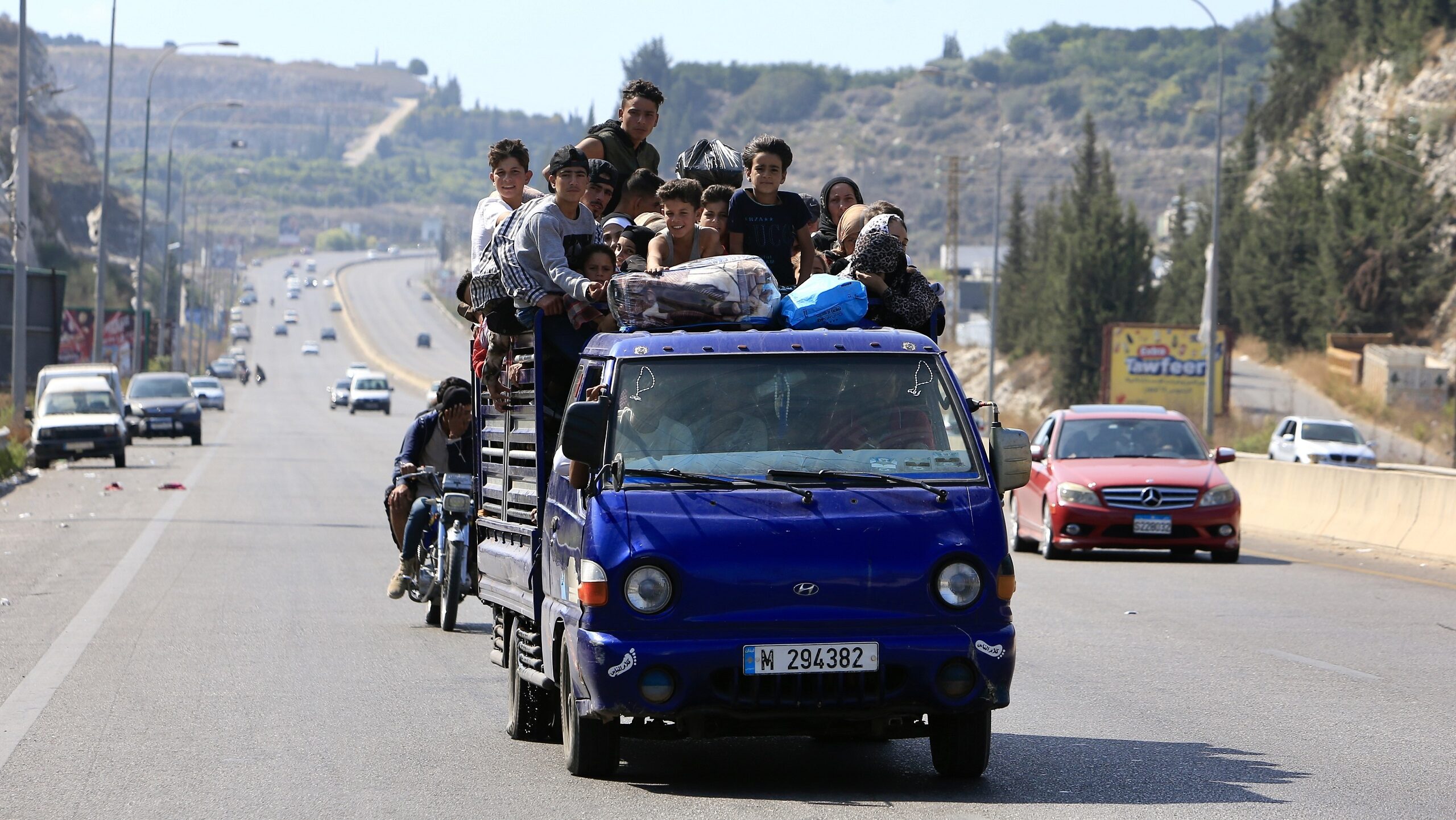‘Our Boys Will Protect Us’: Lebanese Families Flee as Conflict Rages in the South
Families from southern Lebanon seek refuge in makeshift schools, standing defiant despite the chaos around them
(Beirut) With one glance, Amira’s eyes fill with tears. “Can you help me?” she pleaded, revealing a large scar on her chest. “Couldn’t you give me some money?” she asked, holding the few medicines she had managed to bring with her. “It’s my heart, cholesterol, sugar…” the woman in her 50s began listing, her voice trembling.
Yesterday we had to leave our village; Israel started attacking us
At her side, her daughter Sara, 21, consoled her. “Calm down, Mom, everything is fine now,” she said gently. “Yesterday we had to leave our village; Israel started attacking us,” Sara told The Media Line, carrying four bags filled with food and hygiene products into their new shelter.
People continue to arrive from southern Lebanon, now a war zone. Cars packed with people, exhausted from hours on the road, finally reach a place where they can breathe freely. Their destination is far from luxurious—it is a hotel school that has turned its classrooms into makeshift rooms for entire families. “They don’t have beds, but they do have a mattress on the floor, so that’s fine for us,” said Sara, seeing the exodus as a chance to meet new people and see beyond her village in southern Lebanon.
Her mother, however, finds no comfort in the escape. Every word she speaks, most often a request for money, breaks her voice and brings her to tears. “My sisters live in Beirut,” Amira told The Media Line, but despite her family ties to the Lebanese capital, she has been staying in this government shelter in Dekwaneh, just outside the city, since Monday.
This holiday season, give to:
Truth and understanding
The Media Line's intrepid correspondents are in Israel, Gaza, Lebanon, Syria and Pakistan providing first-person reporting.
They all said they cover it.
We see it.
We report with just one agenda: the truth.


Desperation is clear in her eyes, as it is in the faces of dozens of others wandering around, disoriented and grieving. In the blink of an eye, Israeli bombs have driven them far from home, unsure of what has happened to their houses. In a single day, nearly 600 residents were displaced.
“There must be about 500 families here, around 1,000 people,” a Lebanese Army soldier guarding the facility told The Media Line. Photography, videography, and even audio recording are prohibited. The atmosphere is tense, especially toward anyone who appears foreign. Unlike other displaced centers, entry has even been denied to Syrian refugees, who have once again fled bombings.
The overwhelmed Lebanese government has initiated a national emergency plan to manage the mass exodus. Though official figures are still unavailable, it’s clear that tens of thousands have been displaced. Many have spent long hours on Lebanon’s roads.
“It took me and my family 15 hours,” said Ali, a 12-year-old from Maroun, just meters from the Israeli border. Normally, the journey to Beirut would take just over two hours. “My house has been completely destroyed,” Ali told The Media Line, his piercing blue eyes wide with emotion.
We are not afraid; we have seen the bombings from our house, but we are not afraid
“If we have to stay here, Hezbollah will give us money to do so,” he explained to his newly arrived cousins. They find it hard to believe. “We are not afraid; we have seen the bombings from our house, but we are not afraid,” Hasan told The Media Line. Despite seeing the destruction firsthand, they remain resolute. “Of course we want to go back, it was Israel who threw us out,” he added, bitterly.
The long journey hasn’t drained their energy. They wander through the small garden at the shelter’s entrance, bored. With schools closed by the Ministry of Education and few belongings, the children watch the hours pass.
We didn’t know each other before, but here we all help each other
Some women use the patio to smoke hookah, with little else to do. “We didn’t know each other before, but here we all help each other,” Zahra told The Media Line, as a trailer arrived with water jugs and a car with mattresses tied to the roof. “Right now, each family has a room, but if we run out of space, no problem—everyone’s welcome in ours,” said Zahra, a mother of 10.
“I have 10 children because this is what we do; bringing children into the world to make our army stronger, that is why our country is so beautiful,” Zahra, dressed in a black tunic and scarf, says. Her clothes, along with the optimism in her words and the respect she commands among the other displaced, suggest she is a Hezbollah supporter.
Dressed similarly, her friend Fatima added: “We are happy that our houses are being destroyed, this is an opportunity to get out of the village and meet people.” With a broad smile, she continued, “We’re not worried—our boys will protect us.” Behind her, Khairiya silently shed a few tears.

